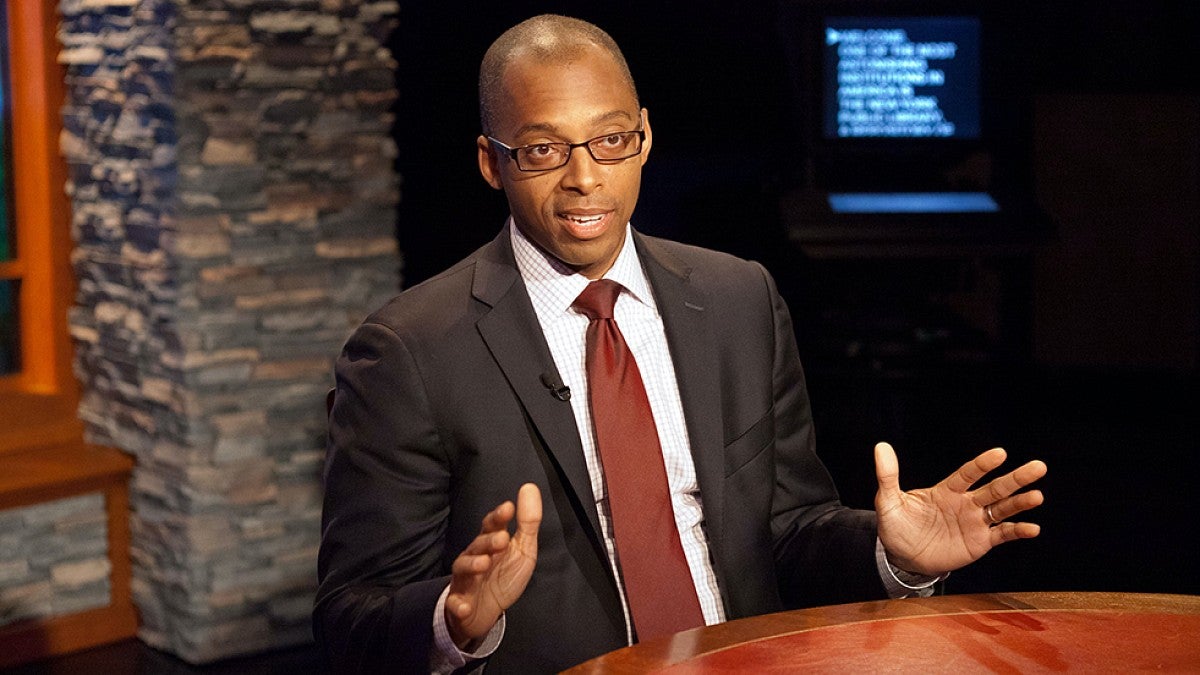Khalil Gibran Muhammad, a professor at Harvard Kennedy School, will speak on Jan. 13 to campus.
Khalil Gibran Muhammad, a scholar of history, race and public policy at Harvard Kennedy School, will discuss antiracist research and the role of universities in the next presentation of the African American Workshop and Lecture series.
Muhammed’s lecture, “The Role of Antiracist Research in the Academy and Beyond,” will take place virtually Jan. 13 from 5:30 to 7 p.m. The event is free and open to the public. Pre-registration by Jan. 12 is required.
Muhammed also will meet with small groups throughout the day, including the Black Student Task Force and other campus and community leaders.
In addition to his professorship at Harvard, Muhammed is the Suzanne Young Murray Professor at the Radcliffe Institute for Advanced Studies and former director of the Schomburg Center for Research in Black Culture, a division of the New York Public Library and one of the nation’s premier research facilities dedicated to African American history and the study of the African diaspora.
Much of Muhammad’s academic scholarship focuses on the intersections of race, democracy, inequality and criminal justice in modern U.S. history. His first book, “The Condemnation of Blackness: Race, Crime, and the Making of Modern Urban America” won the John Hope Franklin Publication Prize for the best book in American studies.
He is co-editor of “Constructing the Carceral State,” a special issue of the Journal of American History and a contributor to a National Research Council study, “The Growth of Incarceration in the United States: Exploring Causes and Consequences.”
Muhammad is on the team of the Institutional Antiracism and Accountability Project initiative at the Harvard Kennedy School’s Shorenstein Center. The center’s goal is to use research and policy to promote antiracism as a core value and institutional norm while “working at the intersection of community, academia, and policy to address intellectual and practical questions as they relate to antiracism policy, practice, and institutional change.”
Provost Patrick Phillips sees enormous benefit in Muhammad’s visit to the UO at this time.
“Muhammad’s work with the IARA and scholarship on how the academy can institutionalize antiracism values through policies and research mirrors some of the work that we are beginning at the University of Oregon,” Phillips said.
Muhammed and antiracism and accountability project colleague Erica Licht addressed the difference between talking about diversity and Black Lives Matter versus institutionalizing antiracism values in the recent article published in the Boston Globe, “Why words aren’t enough from companies claiming to support Black Lives Matter.”
As Muhammed and Licht explain, “The perpetual goal of achieving diversity cannot be a substitute for redistributing organizational power and pursuing racial justice in society. What’s painfully clear about diversity and solidarity statements is that they are a lot easier to write than to follow. After all, most everyone has both.”
Through research by the antiracism and accountability project, however, they conclude there is reason to be cautiously optimistic about change,
Muhammed’s work has also been featured in both national and broadcast media outlets, including The New York Times, The New Yorker, The Washington Post, The Nation, National Public Radio, “Moyers & Company” and MSNBC. He has appeared in a number of feature-length documentaries, including the Oscar-nominated “13th” and “Slavery by Another.” He was an associate editor of The Journal of American History and a prior Andrew W. Mellon fellow at the Vera Institute of Justice.
Muhammed has been the recipient of numerous awards and honors, including the Distinguished Service Medal from Columbia University’s Teachers College, two honorary doctorates, BPI Chicago’s Champion of the Public Interest Award, The Fortune Society’s Game Changer Award, Ebony Power 100, The Root 100 of Black Influencers and numerous awards for teaching excellence. He is on the boards of the Vera Institute of Justice, The Museum of Modern Art, The New York Historical Society and The Nation magazine.
For more information on the lecture or other events in the African-American Workshop and Lecture series, see the Division of Equity and Inclusion website.
—By tova stabin, University Communications


